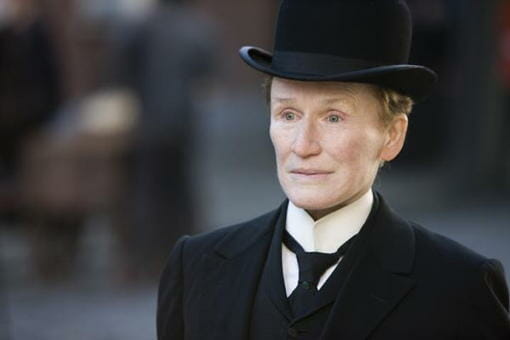By Meredith Alloway · February 7, 2012

It’s no doubt Albert Nobbs is Ms. Glenn Close’s passion project. Not only does she star in the title role, she also co-wrote and co-produced the film. She also managed to finally bring the character to the screen, after playing the role off-broadway over 30 years ago. Close should be applauded for her ambition, including her intricate, dedicated depiction of the peculiar Mr. Nobbs. Unfortunately, the film proves slightly lackluster, despite the array of impressive performances.
Albert Nobbs is a woman. For thirty years she has been dressing up in men’s attire and surviving in the world of 19th century Dublin with complete secrecy. Albert works as a waiter at Morrison’s Hotel where he saves every bit of money he makes. Under the floorboards is where he keeps his loot with the hope of one day opening a tobacco shop. We soon learn that Albert is very much alone and has no true friends. All the other workers in the hotel find him strange and uncomfortable.
Things begin to change when Hubert Page, hired to re-paint the motel, is forced to share a bed with Albert. He soon discovers Albert’s true identity and to Albert’s surprise, Hubert is also a woman. Albert finds solace in Hubert, learning that he is married to a lovely wife and is truly happy. Albert decides he will find a wife of his own and his eye is set on the young motel maid Helen (Mia Wasikowska).
The motel is full of colorful, vivacious characters; a much needed contrast to Albert’s refrained demeanor. Guests are coming in and out of the brass Mrs. Baker’s (Pauline Collin) abode, including the wise Dr. Holloran, a wonderful as always Brendan Gleeson. A tumultuous love blossoms between Helen and Joe (Aaron Johnson), another worker in the motel, and soon Albert is pulled between the two.
It can’t be denied that every actor in the film is on point, and perhaps giving their best performances yet. Close knows Nobbs through and through finds success in her specificity with movement, voice and costume. Nobbs move through life like Charlie Chaplin, depicting both tragedy and comedy in his awkward wobble. Wasikowska and McTeer are the two breaths of fresh air in the film. Helen’s fragility and naivety prove heart-wrenching. She wears her emotions on her sleeves, as does her lover Joe, and it wonderfully juxtaposes Albert’s inability to do the same.
But despite Close’s and the rest of the casts’ intricate performances, Nobbs is still a character you have to pull off the screen. He’s a peculiar, unusual personality indeed, but at the end of the film you’re left feeling more awkward than entertained. Seeing him break free of his self-imposed prison might have been more compelling than observing his mundane task of existing within it.